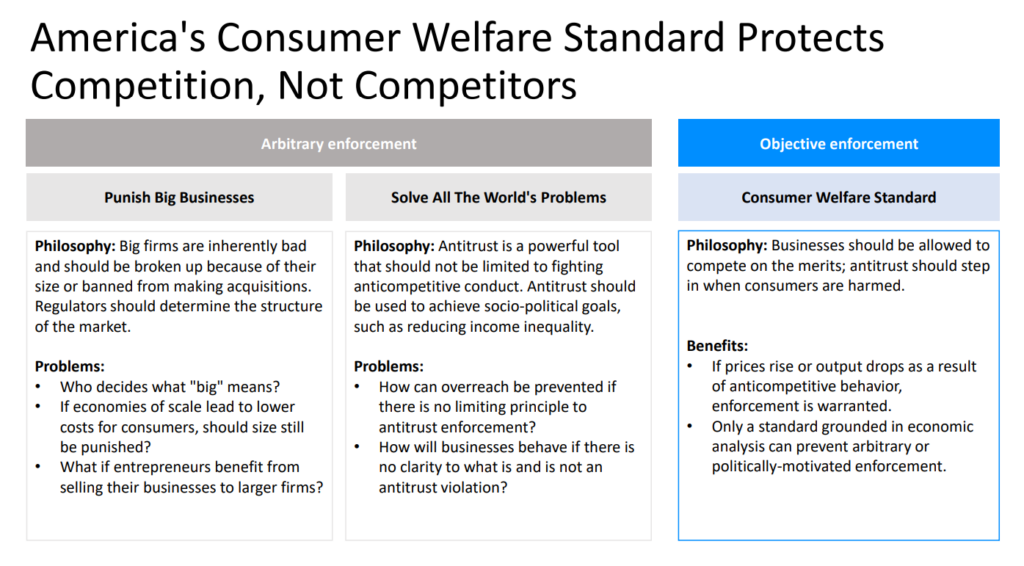Reminder: Antitrust Policy And Enforcement Should Be Based On Economics And Existing Law
During last week’s anti-monopoly summit, some policymakers advocated for a subjective, Neo-Brandeisian approach to antitrust.
To date, Neo-Brandeisian proposals like AICOA or OAMA have little momentum in Congress or support from Americans, so regulators are moving to ignore set rules and policies in order to overstep their authority and legislate through regulation. With this in mind, it is important to remember that antitrust should instead continue to center around objective, evidence-based economics which has powered the American economy.
Here’s what you need to know:
Some policymakers reaffirmed their commitment to Neo-Brandeisian antitrust and moving away from the consumer welfare standard, which could lead to arbitrary enforcement.
The FTC has “jettisoned the consumer welfare standard,” explains American Action Forum President Doug Holtz-Eakin. “[The] FTC has jettisoned the consumer welfare standard in favor of…what? It is sometimes referred to as a New Brandeis approach to antitrust policy, which is concerned with firm size in isolation.”
— Holtz-Eakin continues: “It is genuinely hard to understand exactly what is going on other than the arbitrary and capricious exercise of executive authority. This runs the risk of undermining the agency’s credibility with the courts, making future FTCs less effective.”
Recent legislative proposals have been a “significant departure” from precedent and the consumer welfare standard, notes Sean Heather of the U.S. Chamber of Commerce. “AICOA is a significant departure from the history of American antitrust legislation which has long been based on the consumer welfare standard. Only when consumers, not competitors, are negatively impacted in terms of price or service is antitrust enforcement appropriate. That consumer-based standard has allowed the United States’ private sector to lead the world in technological innovation and investment.”
With little traction on Capitol Hill, unelected bureaucrats and the FTC are attempting to shape the economy by issuing rules on “unfair methods of competition,” which (contrary to some policymaker statements) they lack authority to do, and pursuing aggressive enforcement.
Former FTC Commissioner Christine Wilson questioned “whether the Commission possesses the requisite authority” to expand Section 5. “As I have said elsewhere, I question whether the Commission possesses the requisite authority to promulgate substantive rules on ‘unfair methods of competition.’ Moreover, I question the wisdom of doing so.”
The FTC has essentially claimed the authority to “on a whim to decide whatever it feels might be unfair” says Sean Heather. “The FTC has effectively declared pro-consumer competition illegal. In the FTC’s view, the agency can deem any business conduct as ‘unfair’ without any showing of harm to consumers, anticompetitive intent, market power, or market definition. As dissenting Commissioner Christine Wilson explains, ‘The Policy Statement adopts an ‘I know it when I see it’ approach premised on a list of nefarious-sounding adjectives, many of which have no antitrust or economic meaning.’ This leaves the FTC with carte blanche control over the economy, allowing it on a whim to decide whatever it feels might be unfair.”
— Heather continues: “If the FTC is allowed to implement this policy statement, consumers should expect higher prices, fewer choices, and less innovation. Such deep government intervention into our economy would have catastrophic consequences to free enterprise.”
Antitrust should continue being based on objective evidence of consumer harm.
“Gerrymandering rules” are not smart policy and any antitrust reforms should “pursue principles of general applicability aimed at advancing all consumers’ welfare,” explains CCIA President Matt Schruers. “Gerrymandering rules simply to punish one group of businesses for the benefit of another is not smart competition policy. If Congress is serious about antitrust reform, it should pursue principles of general applicability aimed at advancing all consumers’ welfare.”

